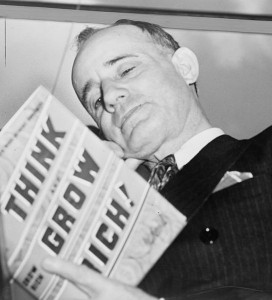 In the early 20th century, at the behest of Andrew Carnegie–the businessman, industrialist, and philanthropist who was then the richest man in the world–, Napoleon Hill, an unknown journalist at the time, spent two decades conducting research in order to organize a Philosophy of Personal Achievement.
In the early 20th century, at the behest of Andrew Carnegie–the businessman, industrialist, and philanthropist who was then the richest man in the world–, Napoleon Hill, an unknown journalist at the time, spent two decades conducting research in order to organize a Philosophy of Personal Achievement.
Armed only with a letter of introduction from Carnegie, Hill set out to interview over 500 people of the caliber of Henry Ford, Thomas Edison, Alexander Graham Bell, John D. Rockefeller, George Eastman, William Wrigley Jr. and Charles M. Schwab. The 32 timeless success principles set forth below are the essence of what Napoleon discovered during his years of research.
1. Know what you want and believe that you can, and will, get it.
2. Master the negative habits which stand between you and success.
3. Develop the positive habits you’ll need in order to succeed. That is, the positive habits that will lead to sound health, peace of mind, and a positive mental attitude.
4. Achieve self-mastery over your thoughts, and constantly direct them toward your goals and objectives. Learn to focus your attention on the goals that you want to achieve and on finding ways to achieve those goals.
5. Exercise self-discipline over all of your emotions. Emotions are states of mind and, therefore, they’re subject to your control and direction. By learning self-mastery over your thoughts, you can achieve self-mastery over your emotions.
6. Start each day by conditioning your mind so that you go throughout the day with a positive mental attitude.
7. Start each day with an expression of gratitude.
8. Cultivate a flexible mental attitude. If you have a flexible mental attitude, then you have the ability to adjust yourself to any circumstance you might find yourself in, without losing your composure. You can’t control the actions of other people, but you can control your reaction to whatever others say or do.
9. Acquire the habit of thinking before you speak. Make sure that what you’re going to say will benefit you and not injure others.
10. Don’t allow trivial matters to turn into major controversies.
11. Don’t allow yourself to be drawn into arguments over unimportant subjects.
12. Adopt the habit of having a good hearted laugh every time you become irritated or angry. Begin each day with one minute of hearty laughing; this will change the chemistry of your brain and start you off with a positive mental attitude.
13. Whenever you have a problem, concentrate your attention on the “can-do” portion of the problem. Then, begin to act where you stand and do what you can in order to solve the problem. Keep in mind that it doesn’t matter what problem you may be having, or what you want to achieve, there is always something you can do right now that will help you. Find out what this something is, and do it.
14. Learn to transmute all unpleasant circumstances into a positive mental attitude by switching your thoughts to something that you find pleasant. Focus on the pleasant thoughts for five minutes in order to change your mental attitude from negative to positive.
15. Remember that your struggles make you stronger.
16. Look upon your life as a continuous process of education, of learning from all of your experiences—both the good and the bad. Be always on the alert for gains of wisdom which come to you a little at a time from both your pleasant and unpleasant experiences.
17. If you can’t think of anything to be grateful for, feel gratitude for the fact that you’ve been given complete control over your own mind. Then, ask for guidance in order that you may use this profound gift wisely in all your thoughts and actions.
18. Go out of your way daily to comment enthusiastically on the good qualities of those with whom you live and work. When you concentrate on the good qualities of others, others will begin to concentrate on your good qualities.
19. Accept all criticism of yourself as an opportunity for self-examination to determine how much of it is justified.
20. Do not accept from life, or from anyone else, anything that you do not desire.
21. Remember always that there are two types of circumstances which cause you to worry: those you can do something about, and those you can do nothing about. The only thing you can do about circumstances you cannot influence is to refuse to allow them to worry you.
22. Always keep your mind engaged in thinking of what you want. Refuse to think of those things which you do not want.
23. If you’re ever feeling sorry for yourself, look around until you find someone who is worse off than yourself and start where you stand to help that person. Make this a habit and you will experience one of the great miracles of life: that which you do to or for others, you do to or for yourself.
24. Choose someone who is the sort of person you would like to be. Then, use that person as a role model and emulate them.
25. Write out this phrase and place it where you can see it often: “Whatever the mind can conceive and believe, the mind can achieve.”
26. Your success is something that you’re going to have to achieve for yourself, without someone telling you what to do or how to do it. Those who amount to something worthwhile in life are those who move on their own personal initiative.
27. Lear to express enthusiasm in your interactions with others. Enthusiasm is contagious and it has a powerful impact on the minds of those who come under its influence. It causes them to respond in a similar spirit of enthusiasm. Here are two examples:
- The most successful lawyers are not those who know the most about the law, but those who are able to influence juries with their belief in their cases, and those who have a great capacity for expressing themselves with enthusiasm.
- As another illustration, you may have noticed that the teachers that you learned the most from in school where those who expressed the greatest enthusiasm in their teaching.
28. Never put off until tomorrow what you can do today. Procrastination is near the top of the list of the causes of failure.
29. Follow Hill’s “QQMA formula”: the Quality of service you render, plus the Quantity of service you render, plus the Mental Attitude in which you render service, determines the space you occupy in your chosen calling and the compensation you get for your services.
30. Stop using your faith in reverse gear by thinking about the things and circumstances which you do not want, and the things that you fear.
31. When overtaken by defeat, remember that man’s faith is tested many times before he’s crowned with final victory. Accept your defeat as nothing more than a challenge to keep trying.
32. Keep thinking of what you want, and keep believing that you can achieve it, in spite of naysayers and any temporary failures, or setbacks, you may encounter.
Conclusion
The main principle taught by Hill is that whatever the mind can conceive and believe, the mind can achieve, regardless of how many times you may have failed in the past, or how lofty your aims and hopes may be. You do this by learning to control and direct your own mind.
Apply the 32 timeless success principles described above, and begin living your best life.



Related Posts:
1. How to Develop Your Character – Benjamin Franklin’s 13 Virtues
2. 72 of the Best Success Quotes
3. 5 Lessons From Motivation Mega-Star Jim Rohn
4. 49 Snippets of Wisdom on How to Succeed
Did you enjoy this article? Subscribe to “Daring to Live Fully” by RSS or by email, and get free updates.








 Marelisa Fabrega is a lawyer and entrepreneur. She holds a Bachelor of Science in Business Administration from Georgetown University in Washington, D.C., as well as a Juris Doctor from the Georgetown University Law Center. You can learn more about her
Marelisa Fabrega is a lawyer and entrepreneur. She holds a Bachelor of Science in Business Administration from Georgetown University in Washington, D.C., as well as a Juris Doctor from the Georgetown University Law Center. You can learn more about her 





